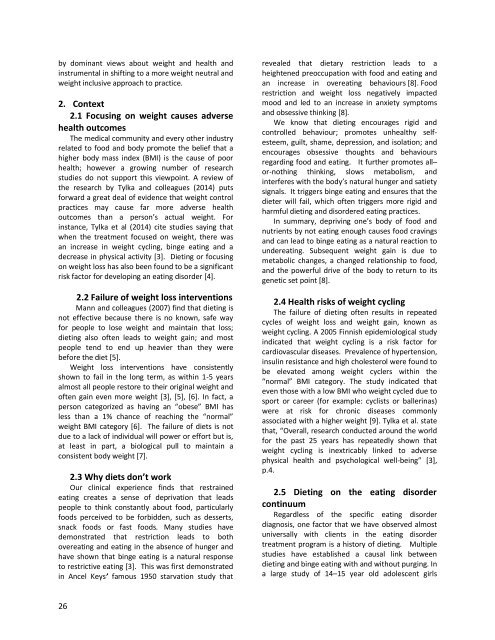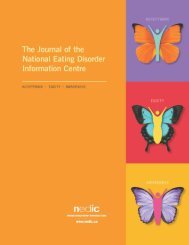NEDIC Conference Journal 2018
Create successful ePaper yourself
Turn your PDF publications into a flip-book with our unique Google optimized e-Paper software.
y dominant views about weight and health and<br />
instrumental in shifting to a more weight neutral and<br />
weight inclusive approach to practice.<br />
2. Context<br />
2.1 Focusing on weight causes adverse<br />
health outcomes<br />
The medical community and every other industry<br />
related to food and body promote the belief that a<br />
higher body mass index (BMI) is the cause of poor<br />
health; however a growing number of research<br />
studies do not support this viewpoint. A review of<br />
the research by Tylka and colleagues (2014) puts<br />
forward a great deal of evidence that weight control<br />
practices may cause far more adverse health<br />
outcomes than a person’s actual weight. For<br />
instance, Tylka et al (2014) cite studies saying that<br />
when the treatment focused on weight, there was<br />
an increase in weight cycling, binge eating and a<br />
decrease in physical activity [3]. Dieting or focusing<br />
on weight loss has also been found to be a significant<br />
risk factor for developing an eating disorder [4].<br />
2.2 Failure of weight loss interventions<br />
Mann and colleagues (2007) find that dieting is<br />
not effective because there is no known, safe way<br />
for people to lose weight and maintain that loss;<br />
dieting also often leads to weight gain; and most<br />
people tend to end up heavier than they were<br />
before the diet [5].<br />
Weight loss interventions have consistently<br />
shown to fail in the long term, as within 1-5 years<br />
almost all people restore to their original weight and<br />
often gain even more weight [3], [5], [6]. In fact, a<br />
person categorized as having an “obese” BMI has<br />
less than a 1% chance of reaching the “normal”<br />
weight BMI category [6]. The failure of diets is not<br />
due to a lack of individual will power or effort but is,<br />
at least in part, a biological pull to maintain a<br />
consistent body weight [7].<br />
2.3 Why diets don’t work<br />
Our clinical experience finds that restrained<br />
eating creates a sense of deprivation that leads<br />
people to think constantly about food, particularly<br />
foods perceived to be forbidden, such as desserts,<br />
snack foods or fast foods. Many studies have<br />
demonstrated that restriction leads to both<br />
overeating and eating in the absence of hunger and<br />
have shown that binge eating is a natural response<br />
to restrictive eating [3]. This was first demonstrated<br />
in Ancel Keys’ famous 1950 starvation study that<br />
revealed that dietary restriction leads to a<br />
heightened preoccupation with food and eating and<br />
an increase in overeating behaviours [8]. Food<br />
restriction and weight loss negatively impacted<br />
mood and led to an increase in anxiety symptoms<br />
and obsessive thinking [8].<br />
We know that dieting encourages rigid and<br />
controlled behaviour; promotes unhealthy selfesteem,<br />
guilt, shame, depression, and isolation; and<br />
encourages obsessive thoughts and behaviours<br />
regarding food and eating. It further promotes all–<br />
or-nothing thinking, slows metabolism, and<br />
interferes with the body’s natural hunger and satiety<br />
signals. It triggers binge eating and ensures that the<br />
dieter will fail, which often triggers more rigid and<br />
harmful dieting and disordered eating practices.<br />
In summary, depriving one’s body of food and<br />
nutrients by not eating enough causes food cravings<br />
and can lead to binge eating as a natural reaction to<br />
undereating. Subsequent weight gain is due to<br />
metabolic changes, a changed relationship to food,<br />
and the powerful drive of the body to return to its<br />
genetic set point [8].<br />
2.4 Health risks of weight cycling<br />
The failure of dieting often results in repeated<br />
cycles of weight loss and weight gain, known as<br />
weight cycling. A 2005 Finnish epidemiological study<br />
indicated that weight cycling is a risk factor for<br />
cardiovascular diseases. Prevalence of hypertension,<br />
insulin resistance and high cholesterol were found to<br />
be elevated among weight cyclers within the<br />
“normal” BMI category. The study indicated that<br />
even those with a low BMI who weight cycled due to<br />
sport or career (for example: cyclists or ballerinas)<br />
were at risk for chronic diseases commonly<br />
associated with a higher weight [9]. Tylka et al. state<br />
that, “Overall, research conducted around the world<br />
for the past 25 years has repeatedly shown that<br />
weight cycling is inextricably linked to adverse<br />
physical health and psychological well-being” [3],<br />
p.4.<br />
2.5 Dieting on the eating disorder<br />
continuum<br />
Regardless of the specific eating disorder<br />
diagnosis, one factor that we have observed almost<br />
universally with clients in the eating disorder<br />
treatment program is a history of dieting. Multiple<br />
studies have established a causal link between<br />
dieting and binge eating with and without purging. In<br />
a large study of 14–15 year old adolescent girls<br />
26




